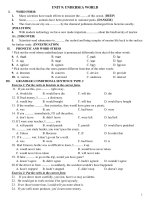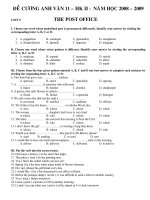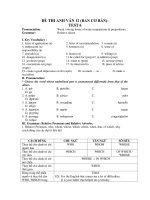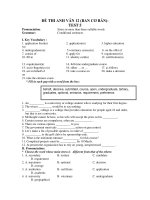Đề Cương Anh Văn Cơ Bản 4 Bài 8
Bạn đang xem bản rút gọn của tài liệu. Xem và tải ngay bản đầy đủ của tài liệu tại đây (749.21 KB, 14 trang )
GENERAL ENGLISH 4
3
UNIT
-
Unit 3: TRANSPORT
UNETI
TRANSPORT
OBJECTIVES OF UNIT 3 - MỤC TIÊU CỦA BÀI 3
After this unit, students will be able to:
Sau bài học này sinh viên sẽ có thể:
1. Use grammar
use: comparatives and superlatives
use: as…….as
Nắm vững và có thể sử dụng thành thạo các hiện tượng ngữ pháp sau:
So sánh hơn và so sánh hơn nhất
So sánh ngang bằng
2. Use vocabulary
to talk about mode of transport
transport compound nouns; verbs transport words
Sử dụng từ vựng để nói về các loại hình phương tiện giao thơng; nhớ và sử dụng được
các danh từ ghép, các động từ liên quan đến chủ đề phương tiện giao thông
3. Apply learned English knowledge of unit 3 into the real life to
to talk about transport in the city
going on a journey
Áp dụng kiến thức tiếng Anh được học của bài 3 vào việc trình bày, đưa ra các quan
điểm cá nhân chủ đề nói liên quan đến các phương tiện giao thông hoặc các chuyến đi
4. Pronounce:
than
sentence stress
intonation
Nhận biết và sử dụng được trọng âm và ngữ điệu trong câu. Cách phát âm từ “than”
5. Improve reading, listening skills by answering the questions related to the topic
"Transport”.
Page 1
Cải thiện các kỹ năng đọc, nghe hiểu thông qua việc trả lời các câu hỏi liên quan đến
chủ đề “Phương tiện giao thông”
6. Know how to write a report, notes and messages
Biết cách viết báo cáo, lưu ý và thông báo
SECTION 1: PREPARATION
OVERVIEW - NỘI DUNG
1
2
GRAMMAR - NGỮ PHÁP
VOCABULARY – TỪ
Comparatives and
superlatives
VỰNG
3
Modes of transport
READING – ĐỌC
Cars in the future
Transport verb words
1. GRAMMAR
1 .1
Complete the sentences with these synonyms of the words in brackets.
1 Swimming is
cheaper
(cheap) than horse riding.
2 Traffic jams in this city are
worse(bad) I’ve ever seen.
3 Sometimes going on foot is
4 I live in
the busiest
more quick(quick) than going by car.
(busy) street of my town.
5 Air travel is still
the most expensive
6 Today is so much
hotter
1 .2
(expensive) form of transport.
(hot) than yesterday.
Write complete sentences with the words using the comparative and
superlative forms.
1. Trams / slow /
trains
Trams are slower than trains.
2. Andy / careful driver / Jason Andy is a more careful driver than Jason.
…………………………………………………………………………………………
3. Indian Railways are larger than railway network in Asia
…………………………………………………………………………………………
4. Working from home is more comfortable than working in an office
…………………………………………………………………………………………
5. That suitcase is the heaviest of all
…………………………………………………………………………………………
6. Electric cars is the best form of transport
…………………………………………………………………………………………
2.………
VOCABULARY
2 .1
Find eight modes of transport.
2 .2
Match these verbs with the correct words.
4commute 5 cross 8go
1
house
1move 2take 6use 3visit
2
the bus
3
relatives
4
to work
5
a river
6
public transport
7
in an office
7work
8
2 .3
over the speed limit
Synonyms: Complete the sentences with these synonyms of the words in
brackets.
catch drop off get on get off go by miss pick up travel
1 Do we have to
get off (leave) the train at the next station?
2 I’ve got to.....................(collect) the children from school at 3 p.m.
3 I usually......................(drive my) car to work.
4 Ask the taxi driver to....................(leave) the children at the school gates.
5 You should leave soon, or you might...................(not catch) your flight.
6 How are you going to.....................(get) to the train station?
7 We’re going to....................(take) the bus to the airport.
8 Passengers can....................(board) the plane at gate 11 in ten minutes.
3. READING
Read the passage and answer the questions.
Today’s cars are smaller, safer, cleaner, and more economical than their
predecessors, but the car of the future will be far more pollution-free than those on the
road today. Several new types of automobile engines have already been developed than
run on alternative sources of power, such as electricity, compressed natural gas,
methanol, steam, hydrogen, and propane. Electricity, however, is the only zeroemission option presently available.
Although electric vehicles will not be truly practical until a powerful, compact
battery or other dependable source of current is available, transport experts foresee a
new assortment of electric vehicles entering everyday life: shorter-range commuter
electric cars, three-wheeled neighborhood cars, electric delivery vans, bikes and
trolleys.
GENERAL ENGLISH 4
-
Unit 3: TRANSPORT
UNETI
As automakers work to develop practical electrical vehicles, urban planners and
utility engineers are focusing on infrastructure systems to support and make the best
use of the new cars. Public charging facilities will need to be as common as today’s
gas stations. Public parking spots on the street or in commercial lots will need to be
equipped with devices that allow drivers to charge their batteries while they stop, dine,
or attend a concert. To encourage the use of electric vehicles, the most convenient
parking in transportation centers might be reserved for electric cars.
Planners foresee electric shuttle buses, trains, buses and neighborhood vehicles all
meeting at transit centers that would have facilities for charging and renting.
Commuters will be able to rent a variety of electric cars to suit their needs: light
trucks, one-person three-wheelers, small cars, or electric/gasoline hybrid cars for
longer trips, which will no doubt take place on automated freeways capable of
handling five times the number of vehicles that can be carried by freeway today.
1. The following electrical vehicles are all mentioned in the passage
EXCEPT_
.
A. vans
B. trains
xC. planes
D. trolleys
2. The author’s purpose in the passage is to
.
A. criticize conventional vehicles
B. support the invention of electric cars
C. narrate a story about alternative energy vehicles x
D. describe the possibilities for transportation in the future
3. The passage would most likely be followed by details about_
.
A. automated freeways
B. pollution restrictions in the future
C. the neighborhood of the future D. electric shuttle buses x
4. The word “compact” in the second paragraph is closest in meaning to
.
A. long-range
B. inexpensive
xC. concentrated
D. squared
5. In the second paragraph, the author implies that
.
A. a dependable source of electric energy will eventually be developed. x
B. everyday life will stay much the same in the future.
C. a single electric vehicle will eventually replace several modes of transportation
D. electric vehicles are not practical for the future
6. According to the passage, public parking lots of the future will be_
.
A. more convenient than they are today B. equipped with charging devices x
C. much larger than they are today
D. as common as today’s gas stations
7. The word “charging” in this passage refers to
.
A. Electricity x
B. credit cards
C. aggression
D. lightning
8. The word “foresee” in this passage could best be replaced with
.
A. count on
B. invent
C. imagine
xD. rely on
9. The word “commuters” in paragraph 4 refers to
.
A. daily travelers x B. visitors
C. cab drivers
D. shoppers
10. The word “hybrid” in paragraph 4 is closest in meaning to
.
A. combination x B. hazardous
C. futuristic
D. automated
xx
Page 5
OVERVIEW
GENERAL ENGLISH 4
-
Unit 3: TRANSPORT
UNETI
SECTION 2: ONLINE MEETING
1WARM - UP
2READING
Check students’
preparation
Transport in the future
3VOCABULARY
Transport: nouns (1)
U NIT 3 - TRANSPORT
4
1LISTENING
WARM - UP
Talking about
electric cars
5
GRAMMAR - NGỮ
PHÁP Comparatives
and superlatives
PRONUNCIATION
Weak pronunciation
of “than”
6
SPEAKING AND
WRITING
Using the
questions to
interview
7
CONSOLIDATION
1.1. Look at the photo. Where is the woman? Why do you think she is travelling
like this?
1.2.
1.14. Listen to someone talking about the photo. Why isn’t the woman inside
the train?
Page 6
1.3. Work in pairs. Which of these modes of transport would you use for the
activities (1- 10)? Explain your reasons why.
1. visit relatives ON A MOTORBIKE
2. move house and furniture
3. get to the airport IN A TAXI
4. see the countryside for pleasure
5. cross a river ON A SHIP
6. get to the railway station
BY TRAIN
7. go out in the evening to a party or restaurant
8. take children to school BY BICYCLE
9. cross the sea
10. go shopping
2
3a. Transport in the future
2.1 Do you travel and use transport every day? How do you commute to work? Are
there many travel problems early in the morning?
2.2 . Read the texts in the diagram below about transport in the future. What kind of
transport does it describe? How is it different from transport today?
2.3 Read the texts again and answer the questions
2.4
Who ….
1. commutes to work every morning? bob
2. knows in advance when there is a problem on the road? sonla
3. don’t use electric cars?sonla
4. can’t drive a long distance without recharging?justin
5. always needs to plug in the car before bedtime? bob
6. has a car which stops you from driving too quickly? justin
7. doesn’t need to commute to his work. bob
8. works in a office. sonla
3
VOCABULARY TRANSPORT (1) NOUNS
Exercise 4. Find the words in the texts in Exercise 2.2 for these definitions.
1. machines with engine for transporting people, e.g. car or bus v vehicle
2. people who travel to work every day c
3. period in a day when lots of people travel to and from
work r
h
4. long line of vehicles on the road t_
j_
5. construction or maintenance on part of a road r
6. place to fill your car with petrol p_
s_
7. the maximum speed you can legally drive s
_w
_
l_
8. people on foot in a town or city p_
4
LISTENING – DISCUSSING ELECTRIC CARS
Exercise 6.
1.15. Listen to two people discussing electric cars. What reasons do
they give for and against this kind of transport?
Exercise 7.
1.15. Listen again. Choose the correct options
1. Electric cars are much cleaner/ louder than petrol cars.
2. Electric cars have the more efficient/ most efficient type of engine.
3. Electric cars are much cheaper/ more expensive than petrol cars.
4. Eight o’clock in the morning is the best/ worst time of the day for commuting.
5. The town needs better/ faster public transport.
5
GRAMMAR – COMPARATIVES AND SUPERLATIVES
Exercise 8. Look at the comparative and superlative adjectives in Exercise 7. Answer
th questions.
1. What letters do you add to regular short adjectives to form comparative and
superlative adjectives? How do you form the comparative and superlative
forms with longer adjectives?
2. Which are examples of irregular comparative and superlative adjectives?
3. Which word usually comes after a comparative adjective? Which word usually
comes after a superlative adjective?
4. What word adds emphasis to a comparative adjective?
1. Electric cars are much cleaner/ louder than petrol cars.
3. Electric cars are much cheaper/ more expensive than petrol cars.
Exercise 10. A local town council asked residents for their views on transport. Look at
the grammar box in Exercise 8. Then complete this extract from the report with the
comparative or superlative form of the adjectives.
6
SPEAKING AND WRITING
Exercise 11. Look at the questionnaire for the survey in Exercise 10. Use these
questions to interview other students about transport where they live. Make a note of
their answers.
Exercise 12. Work in pairs. Compare your notes and answers from the questionnaire.
Then write a short report, similar to the one in Exercise 10.
7. CONSOLIDATION
6
After the lesson, you have
practiced pronouncing “than”
revised comparatives and superlatives
practiced listening to someone discusssing about electric cars
had extensive reading on transport
8. ASSIGNMENTS
WORKBOOK ONLINE:
- Do workbook online
HOMEWORK:
Exercise 1:
Tell about your favourite way to travel (by plane, by train, by bus, by car, by
motorbike, by bike, on foots). What is your least favourite way to travel? Why?
- Name of your favourite way to travel? Why?
- Name of your least favourite way to travel? Why?
Exercise 2:
Imagine about the transport of Hanoi in 2050. Tell about it.
- private transports or public transports?
- convenient or inconvenient?
- pollution?
- Do you like it? Why?
Exercise 3:
Write a paragraph about a transport problem they once had, or regularly have
P/S: The e-lectures are in the process of development. We hope to have a better series
for our dear students. All feedback is welcome and appreciated. E-mail:
Thank you!









